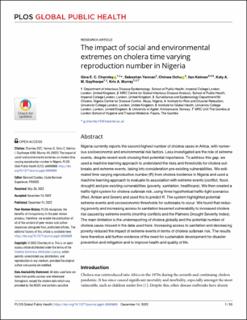| dc.contributor.author | Charnley, Georgina E. | |
| dc.contributor.author | Yennan, Sebastian | |
| dc.contributor.author | Ochu, Chinwe | |
| dc.contributor.author | Kelman, Ilan | |
| dc.contributor.author | Gaythorpe, Katy A. M. | |
| dc.contributor.author | Murray, Kris A | |
| dc.date.accessioned | 2023-05-25T07:21:15Z | |
| dc.date.available | 2023-05-25T07:21:15Z | |
| dc.date.created | 2023-05-11T16:36:43Z | |
| dc.date.issued | 2022 | |
| dc.identifier.citation | Charnley, G. E., Yennan, S., Ochu, C., Kelman, I., Gaythorpe, K. A. M. & Murray, K. A. (2022). The impact of social and environmental extremes on cholera time varying reproduction number in Nigeria. PLOS Global Public Health, 2(12), 1-20. doi: | en_US |
| dc.identifier.issn | 2767-3375 | |
| dc.identifier.uri | https://hdl.handle.net/11250/3068927 | |
| dc.description.abstract | Nigeria currently reports the second highest number of cholera cases in Africa, with numerous socioeconomic and environmental risk factors. Less investigated are the role of extreme
events, despite recent work showing their potential importance. To address this gap, we
used a machine learning approach to understand the risks and thresholds for cholera outbreaks and extreme events, taking into consideration pre-existing vulnerabilities. We estimated time varying reproductive number (R) from cholera incidence in Nigeria and used a
machine learning approach to evaluate its association with extreme events (conflict, flood,
drought) and pre-existing vulnerabilities (poverty, sanitation, healthcare). We then created a
traffic-light system for cholera outbreak risk, using three hypothetical traffic-light scenarios
(Red, Amber and Green) and used this to predict R. The system highlighted potential
extreme events and socioeconomic thresholds for outbreaks to occur. We found that reducing poverty and increasing access to sanitation lessened vulnerability to increased cholera
risk caused by extreme events (monthly conflicts and the Palmers Drought Severity Index).
The main limitation is the underreporting of cholera globally and the potential number of
cholera cases missed in the data used here. Increasing access to sanitation and decreasing
poverty reduced the impact of extreme events in terms of cholera outbreak risk. The results
here therefore add further evidence of the need for sustainable development for disaster
prevention and mitigation and to improve health and quality of life. | en_US |
| dc.language.iso | eng | en_US |
| dc.publisher | Public Library of Science (PLOS) | en_US |
| dc.rights | Navngivelse 4.0 Internasjonal | * |
| dc.rights.uri | http://creativecommons.org/licenses/by/4.0/deed.no | * |
| dc.title | The impact of social and environmental extremes on cholera time varying reproduction number in Nigeria. | en_US |
| dc.type | Peer reviewed | en_US |
| dc.type | Journal article | en_US |
| dc.description.version | publishedVersion | en_US |
| dc.rights.holder | © 2022 The Author(s) | en_US |
| dc.subject.nsi | VDP::Medisinske Fag: 700 | en_US |
| dc.source.pagenumber | 20 | en_US |
| dc.source.volume | 2 | en_US |
| dc.source.journal | PLOS Global Public Health | en_US |
| dc.source.issue | 12 | en_US |
| dc.identifier.doi | 10.1371/journal.pgph.0000869 | |
| dc.identifier.cristin | 2147003 | |
| cristin.qualitycode | 1 | |

